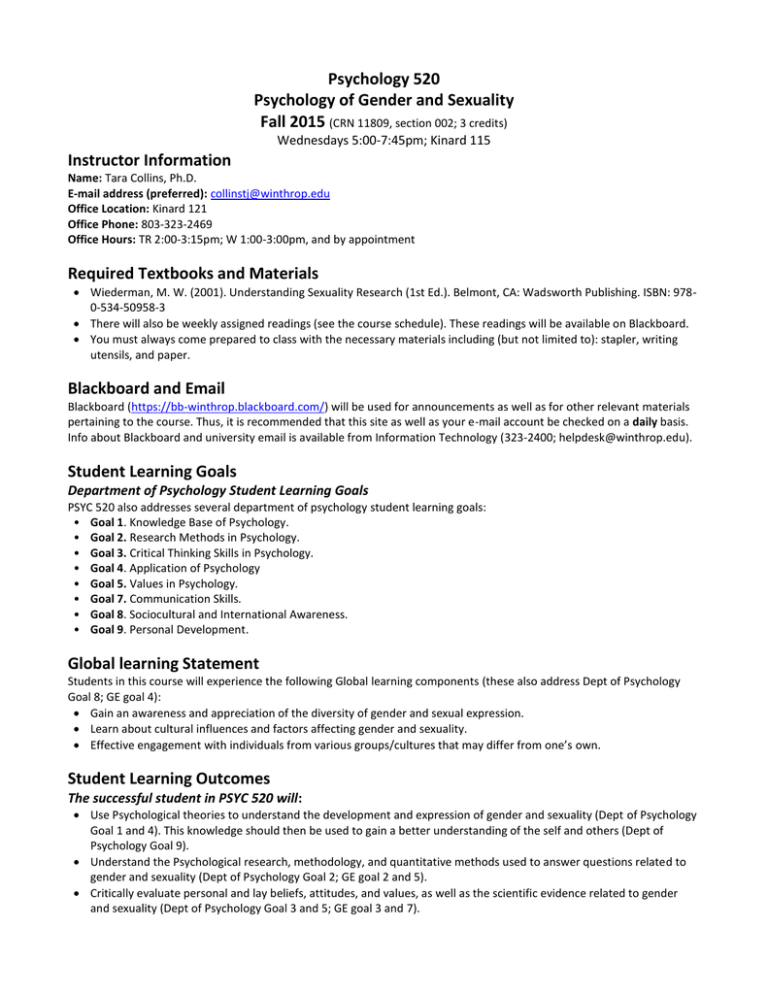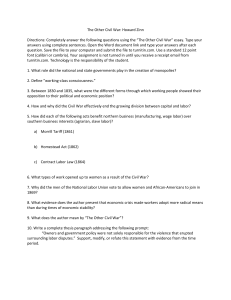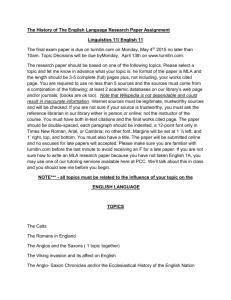
Psychology 520
Psychology of Gender and Sexuality
Fall 2015 (CRN 11809, section 002; 3 credits)
Wednesdays 5:00-7:45pm; Kinard 115
Instructor Information
Name: Tara Collins, Ph.D.
E-mail address (preferred): collinstj@winthrop.edu
Office Location: Kinard 121
Office Phone: 803-323-2469
Office Hours: TR 2:00-3:15pm; W 1:00-3:00pm, and by appointment
Required Textbooks and Materials
Wiederman, M. W. (2001). Understanding Sexuality Research (1st Ed.). Belmont, CA: Wadsworth Publishing. ISBN: 9780-534-50958-3
There will also be weekly assigned readings (see the course schedule). These readings will be available on Blackboard.
You must always come prepared to class with the necessary materials including (but not limited to): stapler, writing
utensils, and paper.
Blackboard and Email
Blackboard (https://bb-winthrop.blackboard.com/) will be used for announcements as well as for other relevant materials
pertaining to the course. Thus, it is recommended that this site as well as your e-mail account be checked on a daily basis.
Info about Blackboard and university email is available from Information Technology (323-2400; helpdesk@winthrop.edu).
Student Learning Goals
Department of Psychology Student Learning Goals
PSYC 520 also addresses several department of psychology student learning goals:
• Goal 1. Knowledge Base of Psychology.
• Goal 2. Research Methods in Psychology.
• Goal 3. Critical Thinking Skills in Psychology.
• Goal 4. Application of Psychology
• Goal 5. Values in Psychology.
• Goal 7. Communication Skills.
• Goal 8. Sociocultural and International Awareness.
• Goal 9. Personal Development.
Global learning Statement
Students in this course will experience the following Global learning components (these also address Dept of Psychology
Goal 8; GE goal 4):
Gain an awareness and appreciation of the diversity of gender and sexual expression.
Learn about cultural influences and factors affecting gender and sexuality.
Effective engagement with individuals from various groups/cultures that may differ from one’s own.
Student Learning Outcomes
The successful student in PSYC 520 will:
Use Psychological theories to understand the development and expression of gender and sexuality (Dept of Psychology
Goal 1 and 4). This knowledge should then be used to gain a better understanding of the self and others (Dept of
Psychology Goal 9).
Understand the Psychological research, methodology, and quantitative methods used to answer questions related to
gender and sexuality (Dept of Psychology Goal 2; GE goal 2 and 5).
Critically evaluate personal and lay beliefs, attitudes, and values, as well as the scientific evidence related to gender
and sexuality (Dept of Psychology Goal 3 and 5; GE goal 3 and 7).
Through verbal and written communication, be able to discuss and evaluate scientific writing and theoretical work
(Dept of Psychology Goal 7; GE goal 1).
Writing Requirements
The improvement of skills related to critical reading and writing is a central goal of this course. I encourage you all to seek
help from as many sources as you can to help improve your written work. I am available during my office hours (and by
appointment) to provide you with additional help. Also, the Winthrop University Writing Center is an excellent resource
that can help you improve the clarity and power of your writing. The Writing Center is located in 242 Bancroft and offers 30
and 60 minute sessions (they accept walk-ins, but you can call 323-2138 to make an appointment). To get the most out of
your session at the Writing Center, have a draft of your paper ready along with a specific question or issue you want to
address. They are especially helpful for issues related to developing a thesis, improving flow, and incorporating references
into your paper.
Academic Success Center
Winthrop’s Academic Success Center is a free resource for all undergraduate students seeking to perform their best
academically. The ASC offers a variety of personalized and structured resources that help students become effective and
efficient learners. The services available to students are as follows: peer tutoring, academic skill development (test taking
strategies, time management counseling, and study techniques), group and individual study spaces, and academic coaching.
The ASC is located in University College on the first floor of Dinkins Hall, Suite 106. Please contact the ASC at 803-323-3929
or success@winthrop.edu. For more information on ASC services, please visit www.winthrop.edu/success .
Use of Turnitin
The issue of digital plagiarism has raised concerns about ethics, student writing experiences, and academic integrity.
Winthrop subscribes to a digital plagiarism detection program called Turnitin.com, which may be used to check papers
submitted in this course. You may be asked to submit your papers in a digital format so that your paper can be checked
against web pages and databases of existing papers. Although you may never have engaged in intentional plagiarism, many
students do incorporate sources without citations; this program can alert me to your academic needs. Additional
information will be provided regarding the submission of your work to turnitin.
Cell phones and Laptops
Please be respectful and ensure that cell phone ringers are turned off during class. Also, no matter how much you try to
hide it, I can see you texting, again, please be respectful. Students are permitted to use laptops in class for the purposes of
note taking only. Engaging in non-course related activities during class may result in the loss of the privilege to use a laptop.
Please see the CAS policy found at: http://www.winthrop.edu/uploadedFiles/artscience/PolicyForHandHeldTechApril2014.pdf for more information regarding the appropriate use of electronics.
Special Needs
Winthrop University is dedicated to providing access to education. If you have a disability and require specific
accommodations to complete this course, contact Services for Students with Disabilities at 323-3290. Once you have your
official notice of accommodations, please see me before the first class assignment.
Student Code of Conduct
As noted in the Student Conduct Code, “Responsibility for good conduct rests with students as adult individuals.” Any form
of academic misconduct, including cheating, plagiarism and/or attendance fraud, will not be tolerated and will result in a
failing grade for the assignment and/ or the entire course as appropriate. You are expected to do your own work and give
credit to others as appropriate when you include it in your own work. The policy on student academic misconduct is
outlined in the “Student Conduct Code Academic Misconduct Policy” online
http://www.winthrop.edu/uploadedFiles/studentconduct/StudentHandbook.pdf and advice for avoiding plagiarism may
be found at http://www.winthrop.edu/uploadedFiles/writingcenter/centerHandoutAvoidingPlagiarism.pdf . All students
are bound by the Student Conduct Code at Winthrop, which contains information about academic misconduct and may be
found at http://www2.winthrop.edu/public/policy/fullpolicy.aspx?pid=252
Note about Course Content and Environment
Students enrolling in this course do so with the understanding that lectures, assignments, classroom discussions,
Blackboard postings and all other activities associated with the course will deal with issues that may be considered by some
to be highly sensitive and perhaps controversial. Students with concerns or questions about the nature of topics in this
course should meet with the instructor prior to the second week of class. Continued enrollment in the course indicates
that you have been informed of the nature of the course content and that you have made an active decision to
participate.
Course content will include a diverse range of sexual attitudes, beliefs and behaviors. Sexually explicit materials, such as
pictures, videos, and websites may be shown during this course, and are important means of understanding the diversity of
human sexualities. As such, you must be at least 18 years of age to enroll in this class.
Students can choose not to view explicit materials without a grade penalty, but should contact the instructor about
information given via these materials, as they may be relevant to exams and course assignments. By enrolling in this course
you understand that you will routinely be exposed to visuals of the human body, individual sexual activity, and sexual
activity between two or more people.
We will attempt to make this class safe for all members. Regardless of race, ethnicity, national origin, gender, sexual
orientation, religion, age, and ability, you will be treated and respected as a human being while in this class. Hatred and
disparaging remarks will not be tolerated, though civil disagreement is encouraged. Making any such remarks either in
class or to a class member outside of class time will result in removal from the class. You will be asked to meet with the
instructor to discuss your remarks and any disciplinary action that may be taken.
As this class will have extensive in-class discussions, we will probably get to know each other well. You should feel free, if
you’re comfortable, to share personal information in class. I ask that no personal information about any of your classmates
be repeated in any part outside of our classroom without that student’s explicit permission.
Concerns/Help
It is my job to help you learn the course material and succeed in class. Come to my office hours or contact me if you have
any concerns about the course, including if you find yourself doing more poorly than anticipated. Please do not hesitate to
see me as soon as possible. Also, if any personal difficulties or issues arise related to any of the topics we cover, please let
me know and I will do my best to refer you to appropriate sources of support or treatment.
Grading
Final course grades will depend on following assignments:
Assignment
Points Possible
Discussion Leader
Assigned Reading Activities
In-class participation
50
150
50
Term Paper
100
Take Home Final Exam
100
Final Total
450
Discussion Leader
Detailed assignment instructions are available on Blackboard. My goal is for this course to be a cooperative learning
experience; one way of accomplishing this goal is to have you all be teachers! You will lead one weekly discussion in a group
of 2-3. As discussion leaders, you will review and lead a class discussion of the week’s assigned readings. In total, the
discussion should last about 45-60 minutes total. As a discussion leader, you should prepare thought-provoking questions
that will stimulate discussion with the class. Original ways of presenting the material are a plus! I would like you to teach
and engage the class in the material–not just prepare a dry, boring speech. Therefore, visual aids or other learning tools
may be useful.
Additional Graduate Student Requirement: Along with the presentation mentioned above, graduate students will be
expected to present to the class an additional peer-reviewed empirical paper of their choice related to any of the course
topics. The format of this presentation should follow the guidelines listed above. This paper needs to be approved by the
instructor at least one week prior to the presentation.
Assigned Reading Activity (ARA)
Detailed assignment instructions are available on Blackboard. For each class between Week #2 and Week #13, you will be
assigned two Assigned Readings to read prior to class. For each of the Assigned Readings, you will write (a) a 4 sentence
summary of the reading, (b) a paragraph long critical evaluation of the reading, and (c) an APA style reference for the
Assigned Reading. Combine a, b, and c for each of the Assigned Readings for the week into one document, this document
should be approximately 1 ½ - 2 pages in length total (double-spaced, 12pt times font).
You are required to complete the first Assigned Reading Activity (ARA 1) due week 2 of class. For this submission you will
be required to submit both electronically to turnitin by 4pm and a hard copy (i.e., printed out) in due at the beginning of
class.
After week 2, you will only be required to turn in 9 of the remaining 11. This means you have two “free” days where you
will not be penalized for missing an assignment submission. Any submissions missed beyond your two free days will count
as a zero, no matter the reason for the miss. Each submission is due electronically to turnitin (submitted through
Blackboard) no later than 1 hour before class begins. You will not be required to turn in hard copies for these subsequent
submissions, but you can if you would like to receive feedback about the assignment from me. When calculating final and
midterm grades, I will randomly select at least two of your submissions to carefully examine when calculating your overall
grade in this category; therefore, make sure all of your submissions reflect your best effort. The primary reason people do
not receive full credit on these assignments is for not following assignment instructions (see detailed instructions on
Blackboard) and/or not addressing feedback that was given on previous submissions.
Course Participation/ Attendance/Homework Assignments
Daily attendance will be taken and will be factored into the final grade in terms of your participation during class. This
course is highly dependent on your interactions with your classmates, me, and guest speakers and, thus, attendance is
essential to success in the course. Course participation will be determined by the quality (not only quantity) of your
interactions/discussions during class. There will also be in-class assignments during some classes, your performance on
these in-class assignments will also be accounted for in your participation grade.
In addition, attendance will be used to help me make decisions regarding borderline grades. For example, if you have a
borderline grade (i.e., within 0.5% of the next highest grade) and you have near perfect attendance (no more than one class
missed) then your grade will be rounded up to the higher grade. In addition, perfect attendance (no absences) will be
rewarded with an additional 3 bonus points that will be added to your final total points.
Attendance in class is based on a student’s presence during the times indicated on this syllabus. Arriving after the beginning
of the class period or leaving prior to the end of the class period will be recorded in the attendance record and may be
counted as an absence and, therefore, zero participation for the entire class period.
It is extremely important that you attend each and every lecture. Regular attendance is necessary for you to fully
understand the material in class. If you do miss a particular lecture, it is your responsibility to read the relevant reading(s)
covered for that day. I do not share my slides/notes with students, so, if you miss please contact a classmate to get the
missed notes.
PSYC 520 Buddy #1 (name, number, email): _____________________________________________________
PSYC 520 Buddy #2 (name, number, email): _____________________________________________________
Term Paper
My goal for this assignment is for you to research something that YOU find INTERESTING! Doing research can be an exciting
experience if you choose the right topic. I will break down this assignment into a series of smaller goals (i.e. topic approval,
approval of references, etc.). Basically, you will be reading a series of articles on your topic and organizing a coherent paper.
It is your job to effectively organize the material and integrate alternative points of view on a topic. Papers should be
approximately 8-10 double spaced, typed pages. I welcome your suggestions about how to fulfill this requirement. More
details for this assignment will be discussed in class, and you will receive a handout outlining the requirements.
I encourage you all to go outside of your comfort zone and to try to investigate a question that is not easily answered
and/or extensively researched.
Additional Graduate Student Requirement: The term paper should be at least 11-15 pages and will require more sources
(see the assignment for details).
Exam
There will be a single take home final exam for this course. You will be given the take home exam questions approximately
one week prior to the final exam date. The take-home final exam will be due by the beginning of the final exam period. You
may turn in the final exam any time prior to the due date, however, no submissions will be accepted after the beginning of
the scheduled final exam.
Late/Make-up policies
Late submission of assignments (without penalty) will only be permitted if proper documentation of extreme
circumstances is provided. Please review the course schedule and take note of all important dates and let me know as soon
as possible if you foresee a conflict. If circumstances can be foreseen, you must talk to me before the date to discuss
arrangements, please contact me regarding such conflicts ASAP and no later than one week before the conflict. If you do
happen to miss an assignment due date you must bring the assignment to the Psychology Department office (Kinard 135)
no later than the next school day (Monday-Friday) following your documented excused day(s) (i.e., if your doctor’s note
excuses you through Tuesday, you must turn in the assignment before 5:00pm Wednesday). If you are submitting a late
assignment to the Department office, then ask the office assistant to time-stamp the submission, also include a copy of
your documentation with the submission, and have them place it in my mailbox. In addition, please contact me via email to
let me know that you submitted the assignment to the Department office. In general, illness, technological, or any other
issues are not valid excuses for missing an online submission, unless explicitly stated in your documentation. In general, no
assignments will be accepted via e-mail. All assignments will be due at the specific times and dates mentioned on
assignment and/or on the course schedule.
Late policy: If you arrive to class late or show up late from a break, you will automatically lose half or all of the participation
points that you earn on that day. Additionally, if you are late on days when an assignment is due or submit to turnitin after
the due date, your grade will be penalized. If you arrive 1-10 minutes late, 10% (i.e., a letter grade) of the possible points
will be deducted from your earned points. If you are between 11 minutes to 24 hours late you will receive a 20 % deduction
(i.e., two letter grades). For each additional 24 hours (including weekends) your submission is late, you will be deducted an
additional 10% of the possible points. This policy applies to both online and in person submissions.
Here are some late assignment scenarios:
•
Alfred submits to turnitin 1 minute late (-10%) and arrives to class 5 minutes late (-10%). For a total penalty of 20%
(i.e., two letter grades). He earned an A for his quality writing, but due to the penalties associated with his poor
time management, he receives a C.
•
•
•
Princess submits her paper in class on time. However, she remembers 2 days later that she forgot to submit to
turnitin, so she submits online 2 days (~45 hours) late. Her final grade was deducted 20%.
Hank submitted his assignment on time to turnitin, but forgot to print a hard copy. The hardcopy paper was due on
Thursday, so he has to wait to bring the hardcopy to class with him on Monday (as there is no way to turn it in over
the weekend). Hank earned a B (82%) for his work, however, since the hard copy was 4 days late, his grade is
deducted 40% and receives a failing grade (42%).
After submitting her paper to turnitin on time, Walter gets in a car accident on her way to class (don’t worry she’s
OK!). She has her police report documenting the accident and shows it to her professor and turns in the paper
when she arrives in class. She earned an A and was not deducted any points because she provided documentation
of her extreme circumstance!
The moral of these stories is simple, turn everything in on time! If an extreme circumstance arises, just make sure to have
documentation and follow the instructions described above.
Important note: In order to maintain fairness across all students, no exceptions will be made to any of the policies
outlined in this syllabus. If you ask me for an exception, I will just refer you back to this document.
Final Letter Grades
Final letter grades will be determined as follows:
Grade earned
A
AB+
B
BC+
C
CD+
D
DF
Minimum Percentage
93.50%
90.00%
86.50%
83.50%
80.00%
76.50%
73.50%
70.00%
66.50%
63.50%
60.00%
59.9% and below
Minimum Points needed
420.75
405
389.25
375.75
360
344.25
330.75
315
299.25
285.75
270
269.9 and below
Syllabus Change Policy
If we need to make modifications to the syllabus, I will post them on Blackboard and announce them in class.
Tentative Course Schedule
Friday, August 28th – Last day to add/drop.
Friday, October 23rd – Last day to drop a course (W will be awarded).
Week
Date
Lecture Topic
1
26-Aug
History/Theory
Assigned Readings
Peterson & Muehlenhard (2007)- What is
sex? (read in class)
Wiederman (2001)- Chapters 2-5
2
2-Sep
Methods/Research
Issues
Wyatt (1994)- Sociocultural Relevance of
Sex Research
Blackless et al. (2000)- How Sexually
Dimorphic are We?
3
9-Sep
Gender
Hyde (2005)- Gender Similarities
Hypothesis
Assignment Due
Required Assigned Reading
Activity (ARA 1) Due
electronically to Turnitin by
4pm and hard (printed) copy
in-class at 5pm
ARA 2- Turnitin only by 4pm
Paper Topic- Turnitin only by
4pm
Week
Date
Lecture Topic
4
16-Sep
Gender
Reading Assignment
Pedersen & Hyde (2010)- Gender
Differences in Sexuality
Assignment Due
ARA 3- Turnitin only by 4pm
Sanchez et al. (2005)- Doing Gender in the
Bedroom
Bogaert (2004)- Asexuality prevalence
5
23-Sep
Orientation
6
30-Sep
Response, Arousal, and
Desire
ARA 4- Turnitin only by 4pm
Diamond (2003)- What does orientation
orient?
Leitenberg & Henning (1995)- Sexual
fantasy review
Basson (2001)- Sexual response cycle
Clark & Hatfield (1979)- Gender diff in
response to casual sex offers
7
7-Oct
Attraction and Mating
Buss & Barnes (1986)- Preferences in
Human mate selection
Wells & Twenge (2005)- Changes in sex
behavior and attitudes over time
8
14-Oct
Behavior
ARA 5- Turnitin only by 4pm
ARA 6- Turnitin only by 4pm
Paper references due in class
only5pm
ARA 7- Turnitin only by 4pm
Kirby et al. (2007)- Sex ed programs on
behavior
Conley et al. (2012)- Examining benefits of
monogamy
9
10
11
12
21-Oct
28-Oct
4-Nov
11-Nov
Relationships
Prejudice and
Discrimination
Atypical behavior and
Dysfunction
ARA 8- Turnitin only by 4pm
Furman & Shaffer (2011)- Sex behavior
with different partner types
Landrine et al. (1995)- physical and
psychiatric correlates of gender
discrimination
Meyer (2003)- LGB prejudice and mental
health
McCabe (2005)- Role of performance
anxiety in dysfunction
Moser & Kleinplatz (2005)-DSM-IV-TR and
the paraphilias: An argument for removal
Pitts et al. (2004)- Who pays for sex and
why-
Sex for Sale
13
18-Nov
Law and Victimization
14
25-Nov
No class- Thanksgiving
15
2-Dec
The Sexual Self
(Identity/social/cultural)
16
10-Dec
6:30pm Final Exam
ARA 9- Turnitin only by 4pm
ARA 10- Turnitin only by 4pm
Annotated ReferencesTurnitin by 4pm and in-class at
5pm
ARA 11- Turnitin only by 4pm
Kingston et al. (2009)- Individual
differences and porn usage
Davies et al. (2001)- Depictions of rape
ARA 12- Turnitin only by 4pm
Peterson & Muehlenhard (2011)-Women
labeling nonconsensual experiences
Final Paper Due- Turnitin by
4pm and in-class at 5pm
n/a
Take home final- Turnitin by
5:30pm and in-class at 6:30pm




